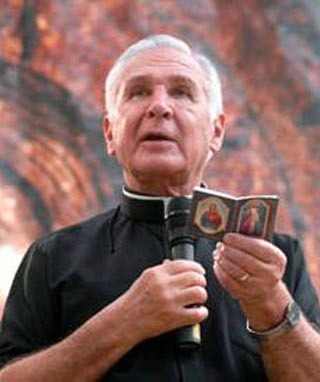
Sacerdote carismático de nacionalidad colombiana y ministerio de predicación internacional, con base desde hace muchos años en New York. Reconocido por su palabra directa y por un notable don de sanación.

Alimento del Alma: Textos, Homilias, Conferencias de Fray Nelson Medina, O.P.

Sacerdote carismático de nacionalidad colombiana y ministerio de predicación internacional, con base desde hace muchos años en New York. Reconocido por su palabra directa y por un notable don de sanación.
Prof Carlos Frenk at Durham University, working with the Virgo Consortium, now has data suggesting that our understanding of the formation and composition of the Universe is incomplete.
These data come from an unlikely source: dwarf galaxies, a "halo" of which surrounds our own Milky Way.
These dwarf galaxies are believed to be mostly made up of dark matter, and contain just a few stars. Their dimness has made them difficult to study in the past.
But the Virgo Consortium has created computer simulations to visualise how the dwarf galaxies formed, using their assumptions about CDM.
The team found that the final results of these simulations did not at all match what we observe. The models showed many more small galaxies in a wide halo around the Milky Way, whereas in reality there are fewer, larger dwarf galaxies.
Prof Frenk explained that there were two "equally disturbing possibilities" for why this is the case.
One idea is that many dwarf galaxies formed as in the simulation, but there were violent supernova explosions during their formation that radically changed the structure of the dwarf galaxy halo.
"If this were the case, it would mean that galaxy formation is a much more exciting process than we thought," said Prof Frenk.
But there are still uncertainties over whether the small fraction of normal matter in the Universe (4%) could have such a fundamental effect on the structure of the dark matter.
An alternative cause for the discrepancies between the modelled data and what we observe is much more fundamental: that CDM does not exist, and the predictions of the standard model relating to it are false.
Prof Frenk said that after working for 35 years with the predictions of the standard model, he is "losing sleep" over the results of the simulations.
vía BBC News – Dwarf galaxies suggest dark matter theory may be wrong.
Puede leerse la parábola del Evangelio de hoy como la historia de los llamados que Dios hace a distintas épocas de la vida, o como un retrato del descontento de los fariseos que no terminan de aceptar que Dios es mayor y más bueno de lo que ellos creían.
34. Una cosa hay cierta para los creyentes: la actividad humana individual y colectiva o el conjunto ingente de esfuerzos realizados por el hombre a lo largo de los siglos para lograr mejores condiciones de vida, considerado en sí mismo, responde a la voluntad de Dios. Creado el hombre a imagen de Dios, recibió el mandato de gobernar el mundo en justicia y santidad, sometiendo a sí la tierra y cuanto en ella se contiene, y de orientar a Dios la propia persona y el universo entero, reconociendo a Dios como Creador de todo, de modo que con el sometimiento de todas las cosas al hombre sea admirable el nombre de Dios en el mundo.
Esta enseñanza vale igualmente para los quehaceres más ordinarios. Porque los hombres y mujeres que, mientras procuran el sustento para sí y su familia, realizan su trabajo de forma que resulte provechoso y en servicio de la sociedad, con razón pueden pensar que con su trabajo desarrollan la obra del Creador, sirven al bien de sus hermanos y contribuyen de modo personal a que se cumplan los designios de Dios en la historia.
Los cristianos, lejos de pensar que las conquistas logradas por el hombre se oponen al poder de Dios y que la criatura racional pretende rivalizar con el Creador, están, por el contrario, persuadidos de que las victorias del hombre son signo de la grandeza de Dios y consecuencia de su inefable designio. Cuanto más se acrecienta el poder del hombre, más amplia es su responsabilidad individual y colectiva. De donde se sigue que el mensaje cristiano no aparta a los hombres de la edificación del mundo ni los lleva a despreocuparse del bien ajeno, sino que, al contrario, les impone como deber el hacerlo.
[Constitucion Gaudium et Spes, del Concilio Vaticano II, n. 33]